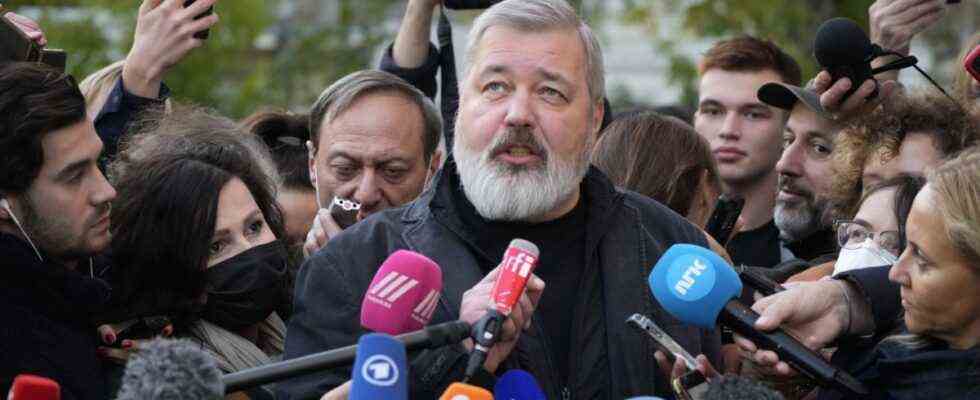By awarding the Nobel Peace Prize to the two journalists Dmitrij Muratow and Maria Ressa, the Nobel Committee in Oslo is sending a clear signal for freedom of the press. In the reporters’ home countries, Russia and the Philippines, the decision was met with mixed feedback. The reactions at a glance.
The Kremlin spokesman congratulates
The Russian reactions to the Nobel Peace Prize for Dmitrij Muratov, editor-in-chief of Novaya Gazeta, could hardly have been more mixed. They can be roughly divided into three groups, the largest being that of honest well-wishers: Independent journalists and members of the opposition were very happy about the award, which Muratov somehow won on behalf of all those who are fighting for freedom of the press in Russia at great risk.
“Real Russian journalism deserves this award, Novaya Gazeta deserved this award, Dmitry Muratov deserved this award, “wrote Alexei Wenediktov, editor-in-chief of the station Radio Moskvy, on its online page. “Fantastic!” Wrote the opposition politician Vladimir Ryzhkov, who is currently in Moscow’s city parliament, on Twitter. “The best news in many years!” Muratov and his newspaper are “the pride of Russia”, they preserve “freedom and dignity in our country”.
Journalists close to the Kremlin reacted less euphorically. Moderator and chief propagandist Dmitry Kisselev, for example, declared the nomination to be one of the most controversial of the Nobel Committee. The award for Muratow “devalues the price”, so Kisseljow, it is difficult “to orientate oneself”. The Kremlin was more positive: “We can congratulate Dmitry Muratov,” said spokesman Dmitry Peskov on Friday. “He works consistently in accordance with his ideals. He is talented, he is brave.” However, according to Peskov, he does not know whether President Vladimir Putin will personally congratulate Muratov.
“Poor Muratov,” wrote the moderator close to the Kremlin, Vladimir Solovyov, in an ironic undertone on Twitter. Alexei Navalny’s supporters would now “tear him to pieces”. In fact, many supporters of the imprisoned opposition member reacted almost disappointedly to the decision from Oslo – they are the third group in the ranks of those who commented on the price for Muratov. Lyubov Sobol from Navalny’s team, for example, congratulated the journalist on Twitter, but emphasized that Navalny was the most important fighter for peace in Russia. The oppositionist Dmitry Gudkov also congratulated Muratov and named them Novaya Gazeta the best newspaper in the country. Nevertheless, Gudkow said it would have been even better if Navalny had received the award.
The laureate himself said several times on Friday that he, too, was more likely to have awarded Navalny. Muratow immediately dedicated the award to the entire editorial team – and above all to his dead colleagues. Six journalists from the Novaya Gazeta have been murdered since it was founded. Dmitrij Muratow is the third Russian Nobel Peace Prize laureate – after the regime critic Andrei Sakharov, who received it in 1975, and the former President of the Soviet Union, Mikhail Gorbachev. He congratulated “this great, bold and honest man and journalist, my friend Dmitry Muratov”. Gorbachev has it Novaya Gazeta supported since it was founded in 1993. The Nobel Peace Prize is “very good news,” said Gorbachev, and it underscores the importance of the press today.
Rodrigo Duterte will not be thrilled
Leni Robredo, Vice President of the Philippines, tweeted after Maria Ressa had been awarded the Nobel Peace Prize – and a few days after she herself announced her candidacy for the highest office in the coming year: “This is recognition and appreciation for your relentless commitment to truth and responsibility. I applaud you for your courage. ” With her investigative platform “Rappler”, Ressa has been uncovering for years how the Philippine head of state Rodrigo Duterte abused his power and hijacked social media.
Maria Ressa, journalist and head of the online news agency Rappler
(Photo: Aaron Favila / dpa)
the Manila Times reported less about Ressa herself than about the speech by Nobel Prize spokeswoman Berit Reiss-Andersen, who pointed out how much the freedom of the press has come under pressure today, including through the spread of fake news. Reiss-Andersen acknowledged that Ressa had also dealt critically with Facebook’s role in the manipulation of public debates. “The spread of hoax and propaganda is an attack on the right to freedom of expression,” the quoted the Manila Times.
Nikkei Asia recalled the ruling against Ressa for “Cyberlibel”, the spreading of a hoax via networks, in a process that most independent observers in South-East Asia had taken to be a sham trial. A businessman had sued Ressa over a story that appeared in her magazine in 2012 Rappler had been published – both Amnesty International and Human Rights Watch saw the conviction as a “blow to the right to freedom of expression,” such as Nikkei Asia wrote again on the occasion of the Nobel Prize award. Behind it was that President Rodrigo Duterte, whom Ressa has been annoying for years because she is investigating his brutal “war on drugs”, was probably behind the indictment. From Duterte no reaction was known until Saturday, although the Nobel Peace Prize was awarded to a laureate from his country. He won’t be thrilled.

